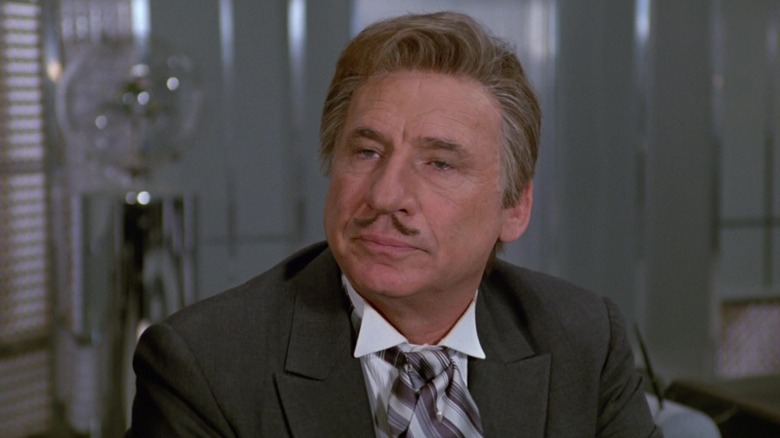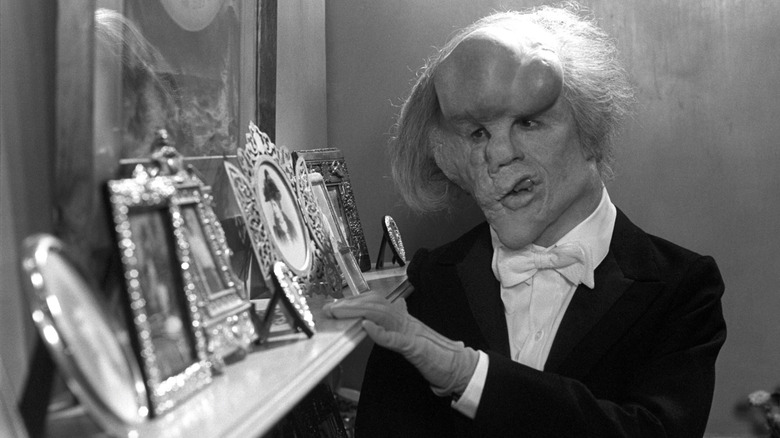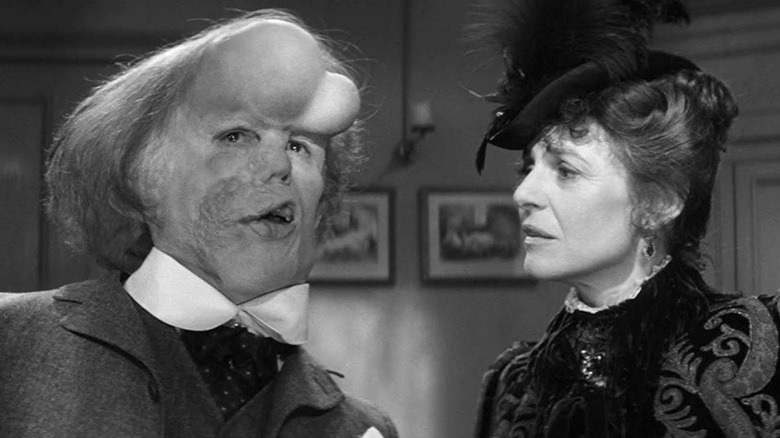
By the late 1970s, Mel Brooks was a worldwide star noted for his hilarious comedy classics. He had already won an Oscar for writing "The Producers" and had released both "Young Frankenstein" and "Blazing
Saddles" in the same year. (Incidentally, those movies were also nominated for Oscars.) After that, he moved on to the ambitious 1976 film "Silent Movie," an actual silent movie, before working on "High Anxiety," a surgically pointed spoof of Alfred Hitchcock's work. Both of those films earned well over $30 million at the box office against a $4 million production budget. Brooks was riding high.
While Brooks was rolling in dough as a Hollywood hotshot, an up-and-coming art student from Missoula, Montana was turning heads at the American Film Institute with his audacious, surreal, and nightmarish films and sculptures. He had already made a few notable shorts, and he graduated with a grant, hoping to make his first feature film. For several years, this ambitious young filmmaker worked on his first movie, working at an incredibly slow pace and constructing a surrealist nightmare of epic proportions. The finished film finally came out in 1977. The movie was "Eraserhead," and the filmmaker was David Lynch.
One would be hard-pressed to find two filmmakers more different than Mel Brooks and David Lynch -- Frank Capra and Jörg Buttgereit, perhaps? -- but the two were more closely linked than some may realize. Brooks, while a comedian, was also fond of surrealism and horror, and he was interested in forming a separate production company specifically so he could serve as an executive producer on non-comedy projects.
It was 1979, and Brooks -- through the usual Hollywood channels -- had happened upon the script for "The Elephant Man," a movie inspired by the life of Joseph Merrick. Brooks was eager to produce it. Not only that, when Brooks saw a special screening of "Eraserhead," he was so impressed that he immediately wanted Lynch to direct "The Elephant Man."
Read more: All 12 Christopher Nolan Movies, Ranked From Worst To Best
Mel Brooks Produced David Lynch's The Elephant Man

As The i Paper recounted in a piece where it interviewed those involved in making the film for its 40th anniversary in 2020, Brooks was handed the script for "The Elephant Man" by his "High Anxiety" assistant director, Jonathan Sanger. Brooks loved the screenplay, but he understood that he couldn't put his name on a project that was meant to be so heart-wrenching. Joseph Merrick -- renamed John in the script -- lived a sad life, having been afflicted with tumors and skin conditions that caused his head and face to become oversized and rough. He had spent many years in the circus, abused by cruel bosses who assumed he couldn't speak or think. Merrick was rescued by a traveling doctor, who discovered he was intelligent, articulate, and very gentle. Brooks felt putting "Mel Brooks Presents" above "The Elephant Man" would be misleading to audiences. Instead, he and Sanger formed Brooksfilms, a company that sounded legit. Brooks felt he could, in a way, produce "The Elephant Man" in secret.
Speaking to The Guardian in 2008, Brooks explained that his "producer friend Stuart Cornfeld" brought Lynch to his attention by convincing him to see "Eraserhead." As Brooks recalled:
"It was a beautiful film in black and white, but I still couldn't really believe that this was the director for the project I'd been working on called 'The Elephant Man,' which a babysitter I shared with one of the writers had slipped to me as a favor. But Stuart was convinced, so I met with David. He'd only meet at one place, called Bob's Big [Boy], where they serve hamburgers and malt shakes. It was way out in the Valley and I wasn't expecting him to be so polite, but I was rather impressed. He made sense and was very savvy about the changes he wanted."
Oh, to have dinner with Lynch at Bob's Big Boy.
A deal was struck, and Lynch signed on. Although "The Elephant Man" was structured like a traditional Hollywood biopic, Lynch made it into something more dreamlike. It became a film about triumph over death and bore the same black-and-white, steam-hissing aesthetics of "Eraserhead." John Hurt, sporting large cranial prosthetics, played John Merrick, while Anthony Hopkins portrayed Frederick Treves, the doctor who rescued him. John Gielgud also appeared, as did Anne Bancroft, Brooks' wife.
The Elephant Man Was A Hit

Notably, Brooks' actual name doesn't appear as an executive producer on Lynch's film. But Brooks clearly knew what he was doing as a producer, because "The Elephant Man" was a hit. It made over $26 million at the box office on a budget of $5 million and became one of that year's Oscar darlings, racking up a total of eight Academy Award nominations (including ones for Best Picture, Best Director, Best Actor, and Best Screenplay). Tragically, though, it won zero, losing out to films like "Ordinary People," "Tess," and "Raging Bull."
Still, the movie cemented David Lynch as a power player in Hollywood, which was a very unlikely outcome indeed. The director was then tapped to helm a major science fiction film, clearly aiming to move him into the realm of summer blockbusters. Many "Star Wars" fans know that Lynch was offered the chance to direct "Star Wars: Episode VI -- "Return of the Jedi," a gig he roundly refused. Instead, he made his own adaptation of Frank Herbert's "Dune," a movie that's amassed a cult fanbase but which Lynch personally hated. After that, Lynch began directing more personal films and TV shows like "Blue Velvet" and "Twin Peaks." The rest is history.
Brooks, meanwhile, continued to produce many notable -- and notably dark -- hits with Brooksfilms. The comedian backed horror films like Freddie Francis' "The Doctor and the Devils," David Cronenberg's "The Fly," and the Chris Walas movies "The Fly II" and "The Vagrant." Brooks is one of the funniest people in history (and he's still kicking at 99), but he also had some marvelously peculiar tastes, happy to proliferate bizarre cult movies, dreamlike prestige pictures, and gloppy horror flicks. Brooks will always be deeply beloved for his many decades of comedy work, but without him, we may not have the David Lynch we all grew to love.
If you're looking for the easiest way to keep up with all the major movie and TV news, why not sign up to our free newsletter?
Read the original article on SlashFilm.











